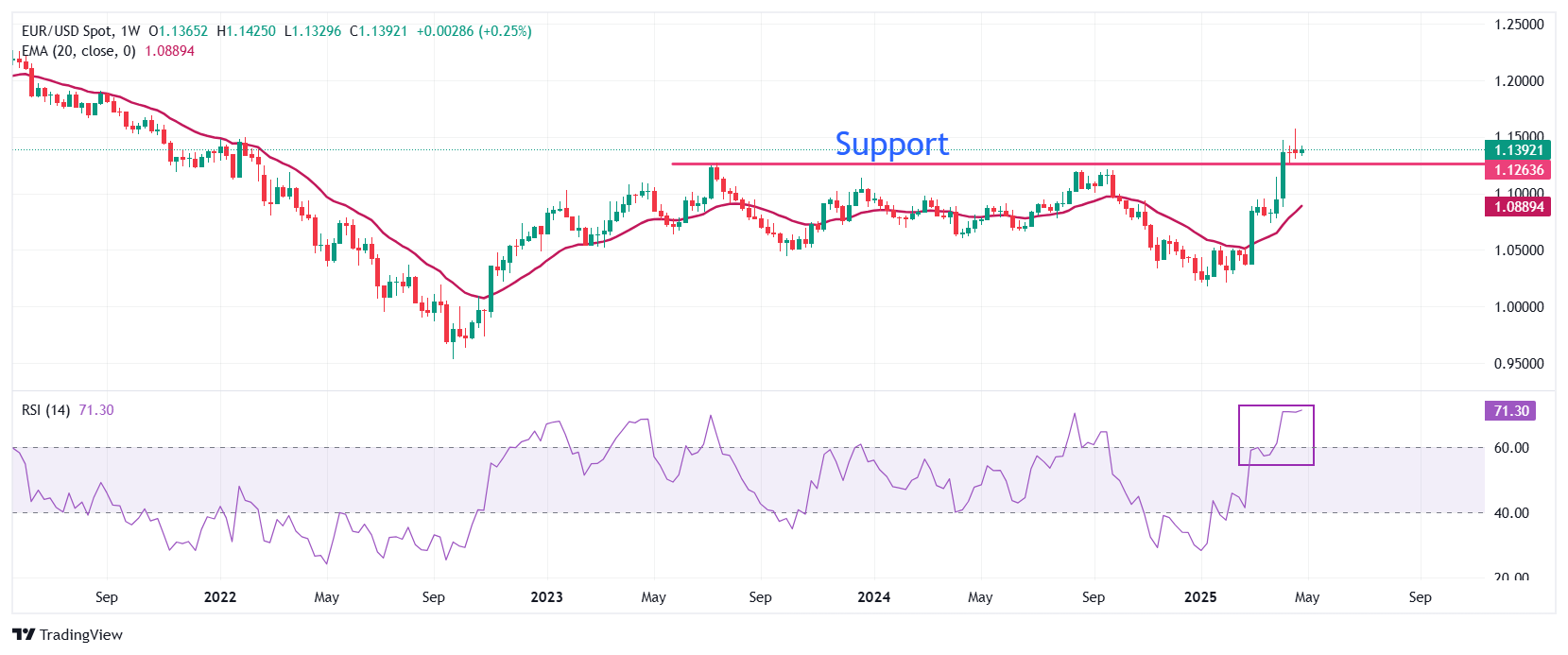- The EUR/USD faces a slight pressure above 1,1400 while the US dollar stabilizes, with investors seeking clarity on commercial perspectives between the US and China.
- The US Treasury Secretary, Scott Besent, has put the responsibility of commercial progress between the US and China in Beijing.
- ECB officials support the need for more cuts in interest rates.
EUR/USD goes back to about 1,1400 during European negotiation hours on Tuesday. The main currency pair lows slightly while the US dollar (USD) stabilizes, but is generally in tension in the midst of the growing uncertainty about commercial perspectives between the United States (USA) and China. The US dollar index (DXY), which tracks the value of the dollar against six main currencies, rises to about 99.20 but operates within Monday’s negotiation range.
The comments of the US Treasury Secretary, Scott Besent, that China should be the one who initiates commercial conversations with the US have increased investors’ doubts about whether commercial discussions are underway. “I think it depends on China Descalear, because they sell us five times more than we sell them”Besent said in an interview on CNBC Squawk Box on Monday.
Meanwhile, the contradictory statements of US President Donald Trump and Beijing about whether Chinese President Xi Jinping called Trump to discuss terms and conditions on trade have also reduced hopes of a resolution of the commercial war between the US and China in the short term.
Donald Trump has insisted that XI of China has called him several times to discuss bilateral trade since the imposition of higher tariffs to Beijing. However, the Chinese Ministry of Foreign Affairs continues to deny any economic and commercial discussion between Trump and XI.
Apart from the White House comments on commercial conversations between the US and China, a series of US economic data will influence the action of the US dollar this week. Investors will pay special attention to the preliminary gross domestic product (GDP), to the Purchase Management Index (PMI) of the ISM, to the change of employment of ADP and the data of non -agricultural payrolls (NFP) of April, as well as the price index of the Personal Consumption (PCE) of March, which will influence the market expectations of the market on the market. (Fed).
In Tuesday’s American session, investors will focus on US Jolts employment offers data for March, which is expected to show that employers published 7.5 million job offers, slightly below 7.56 million seen in February.
What moves the market today: the Eur/USD falls while the euro operates cautiously
- A slight downward movement in the EUR/USD is also driven by slight sales pressure in the euro (EUR), with the officials of the European Central Bank (ECB) expressing the need for more cuts in interest rates. On Monday, the head of the ECB and Governor of the Finnish Central Bank, Olli Rehn, supported the need for a greater expansion of monetary policy and expressed concern about the growing risks that inflation in the euro zone is maintained below the 2% target of the central bank before Trump tariffs.
- Rehn did not rule out the possibility that interest rates fall below the neutral rate. “We must analyze all the options with an open mind and not discard rates cuts below the neutral rate, ” Rehn said in an event, according to Reuters.
- Separately, the official of the ECB and governor of the Bank of France, François Villeroy de Galhau, also emphasized the need for more cuts in interest rates amid fears that Trump’s tariff policy could lead to an economic slowdown. “We still have margin to lower interest rates,” said Villery de Galhau after expressing confidence that inflation will return to the goal of 2% In a radio interview on Monday, according to Reuters.
- For more clues about the monetary policy perspective of the ECB, investors expect the preliminary data of the GDP of the first quarter of the euro zone and the harmonized consumer price index (HICP) for April, which will be published on Wednesday and Friday, respectively.
- Meanwhile, Spain’s GDP data for the January-March period have been weaker than expected. The economy grew 0.6% in the first quarter, below the expectations of 0.7% and the previous publication of 0.8%. Spain HICP data constantly grew by 2.2% year -on -year in April. In monthly terms, inflation data increased at a moderate rhythm of 0.6%, compared to the growth of 0.7% seen in March.
Technical analysis: EUR/USD slides about 1,1400

The EUR/USD loss around 1,1400 in the European session on Tuesday. The main currency pair perspective remains bullish since the 20 -week exponential mobile average (EMA) is upward inclined around 1,0890.
The 14 -week relative force index (RSI) rises to overcomprated levels above 70.00 in the weekly graph, indicating a strong bullish impulse, but possibilities of any correction cannot be ruled out.
Looking up, the psychological level of 1,1500 will be the main resistance for the torque. On the contrary, the maximum of July 2023 of 1,1276 will be a key support for the euros of the euro.
Euro Faqs
The euro is the currency of the 19 countries of the European Union that belong to the Eurozone. It is the second most negotiated currency in the world, behind the US dollar. In 2022, it represented 31 % of all foreign exchange transactions, with an average daily business volume of more than 2.2 billion dollars a day. The EUR/USD is the most negotiated currency pair in the world, with an estimate of 30 %of all transactions, followed by the EUR/JPY (4 %), the EUR/GBP (3 %) and the EUR/AU (2 %).
The European Central Bank (ECB), based in Frankfurt (Germany), is the Eurozone reserve bank. The ECB establishes interest rates and manages monetary policy. The main mandate of the ECB is to maintain price stability, which means controlling inflation or stimulating growth. Its main tool is the rise or decrease in interest rates. Relatively high interest rates (or the expectation of higher types) usually benefit the euro and vice versa. The GOVERNMENT BOOK of the ECB makes decisions about monetary policy in meetings that are held eight times a year. The decisions are made by the directors of the National Banks of the Eurozone and six permanent members, including the president of the ECB, Christine Lagarde.
Eurozone inflation data, measured by the harmonized consumer prices index (IPCA), are an important economic indicator for the euro. If inflation increases more than expected, especially if it exceeds 2% of the ECB, it forces the ECB to rise interest rates to control it again. Relatively high interest rates compared to their counterparts usually benefit the euro, since they make the region more attractive as a place for global investors to deposit their money.
Published data measure the health of the economy and can have an impact on the euro. Indicators such as GDP, manufacturing and services PMIs, employment and consumer trust surveys can influence the direction of the single currency. A strong economy is good for the euro. Not only attracts more foreign investment, but it can encourage the ECB to raise interest rates, which will directly strengthen the euro. Otherwise, if economic data is weak, the euro is likely to fall. The economic data of the four largest economies in the euro zone (Germany, France, Italy and Spain) are especially significant, since they represent 75% of the economy of the euro area.
Another important fact that is published on the euro is the commercial balance. This indicator measures the difference between what a country earns with its exports and what you spend on imports during a given period. If a country produces highly demanded export products, its currency will gain value simply by the additional demand created by foreign buyers seeking to buy those goods. Therefore, a positive net trade balance strengthens a currency and vice versa in the case of a negative balance
Source: Fx Street
I am Joshua Winder, a senior-level journalist and editor at World Stock Market. I specialize in covering news related to the stock market and economic trends. With more than 8 years of experience in this field, I have become an expert in financial reporting.







